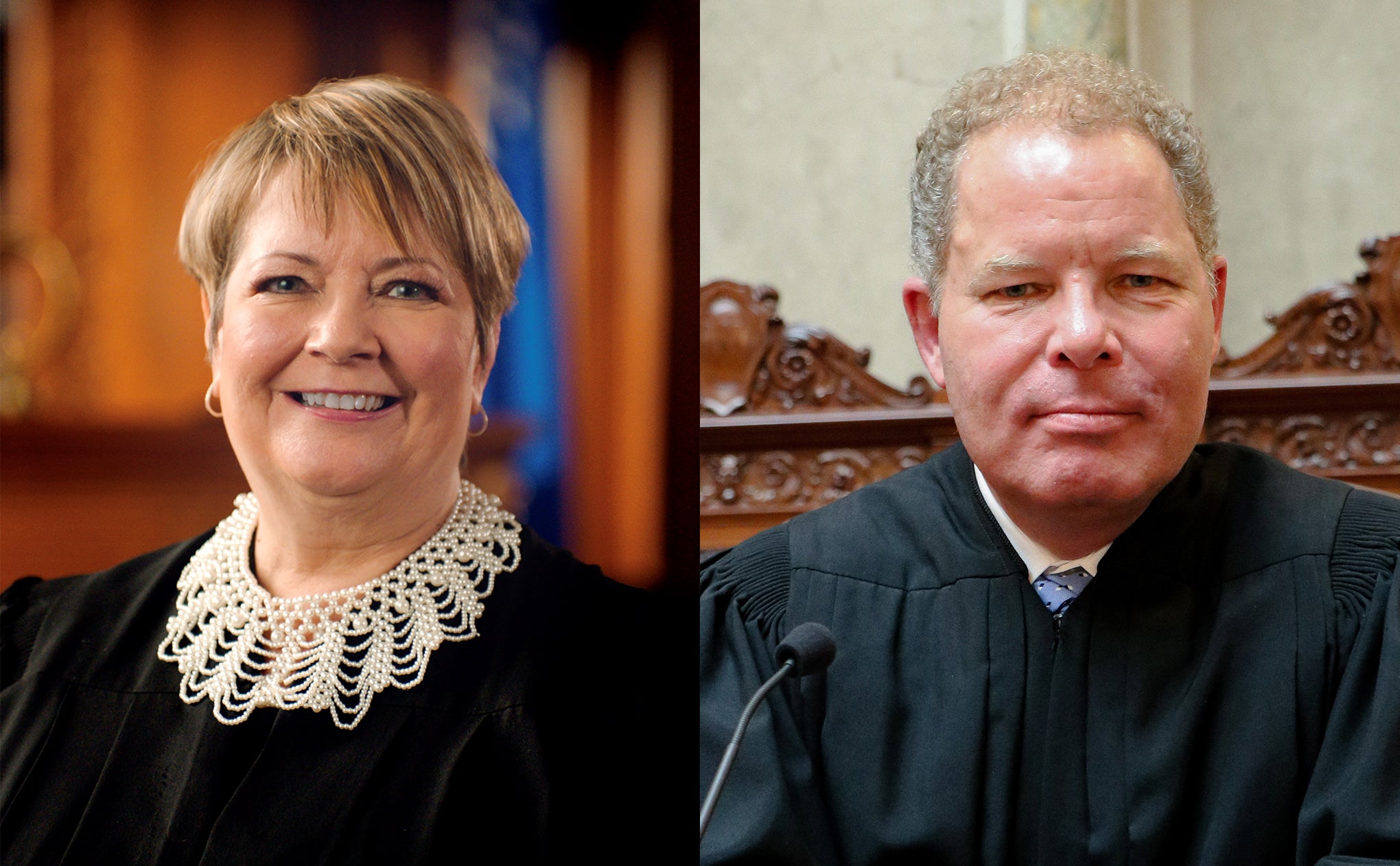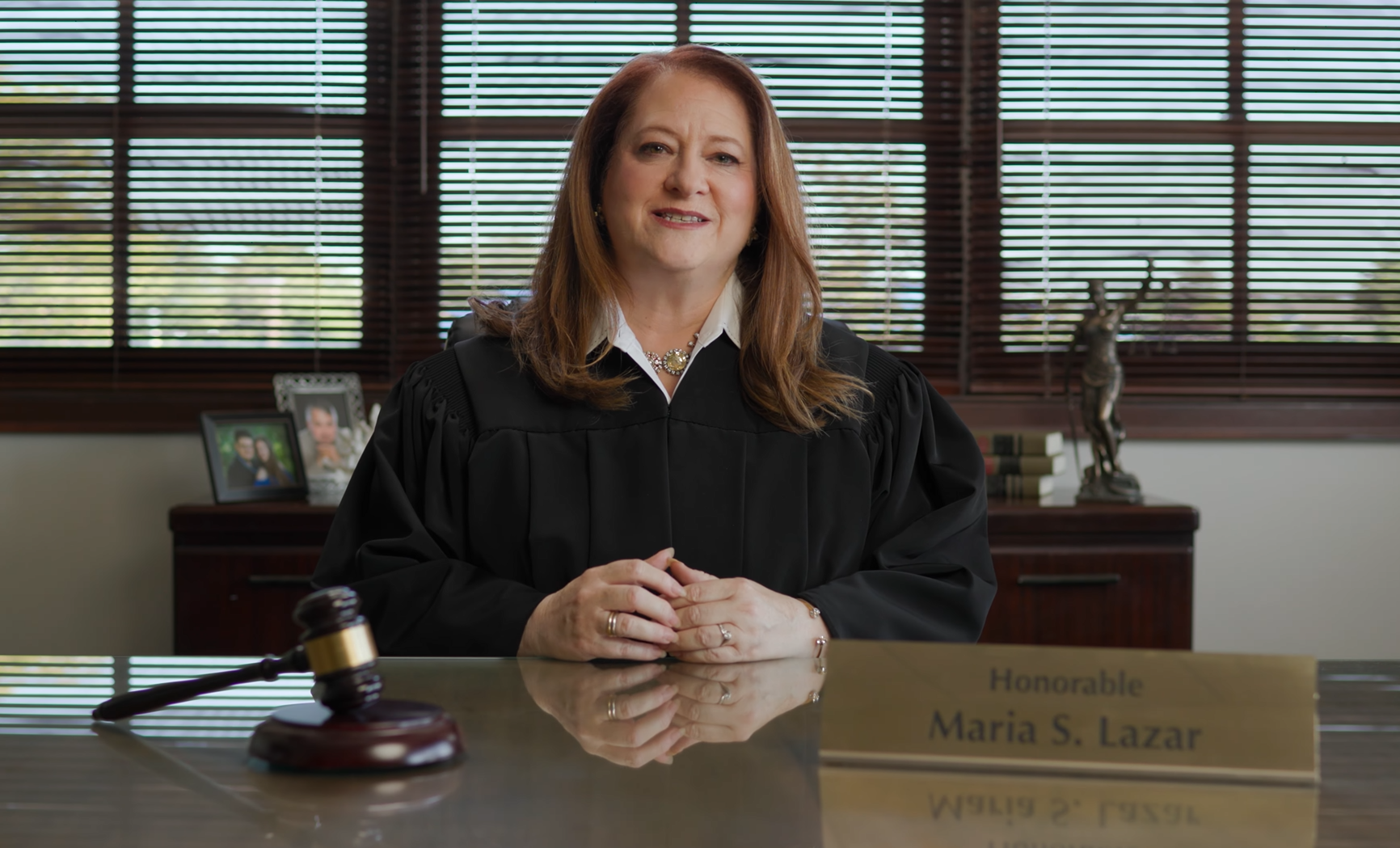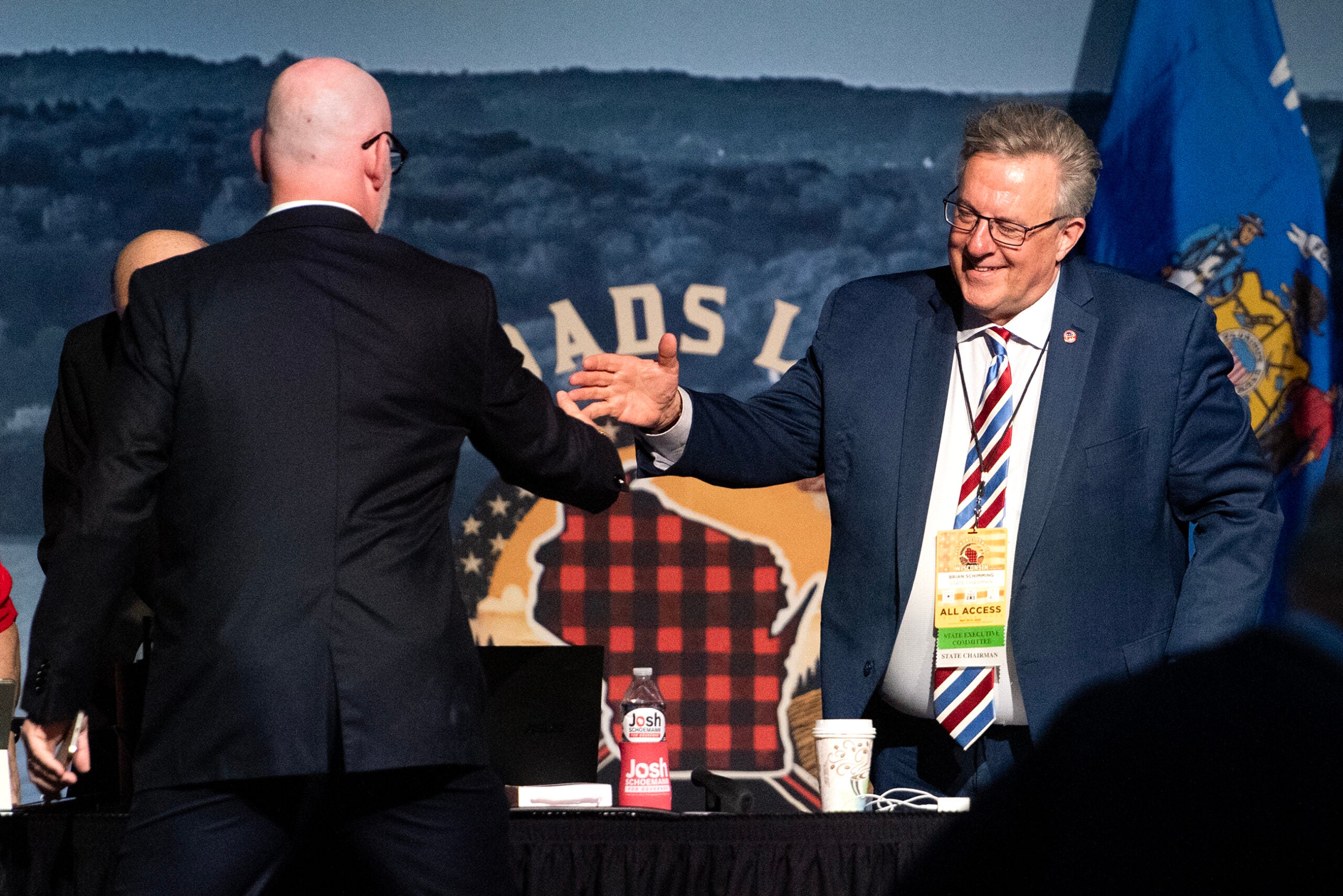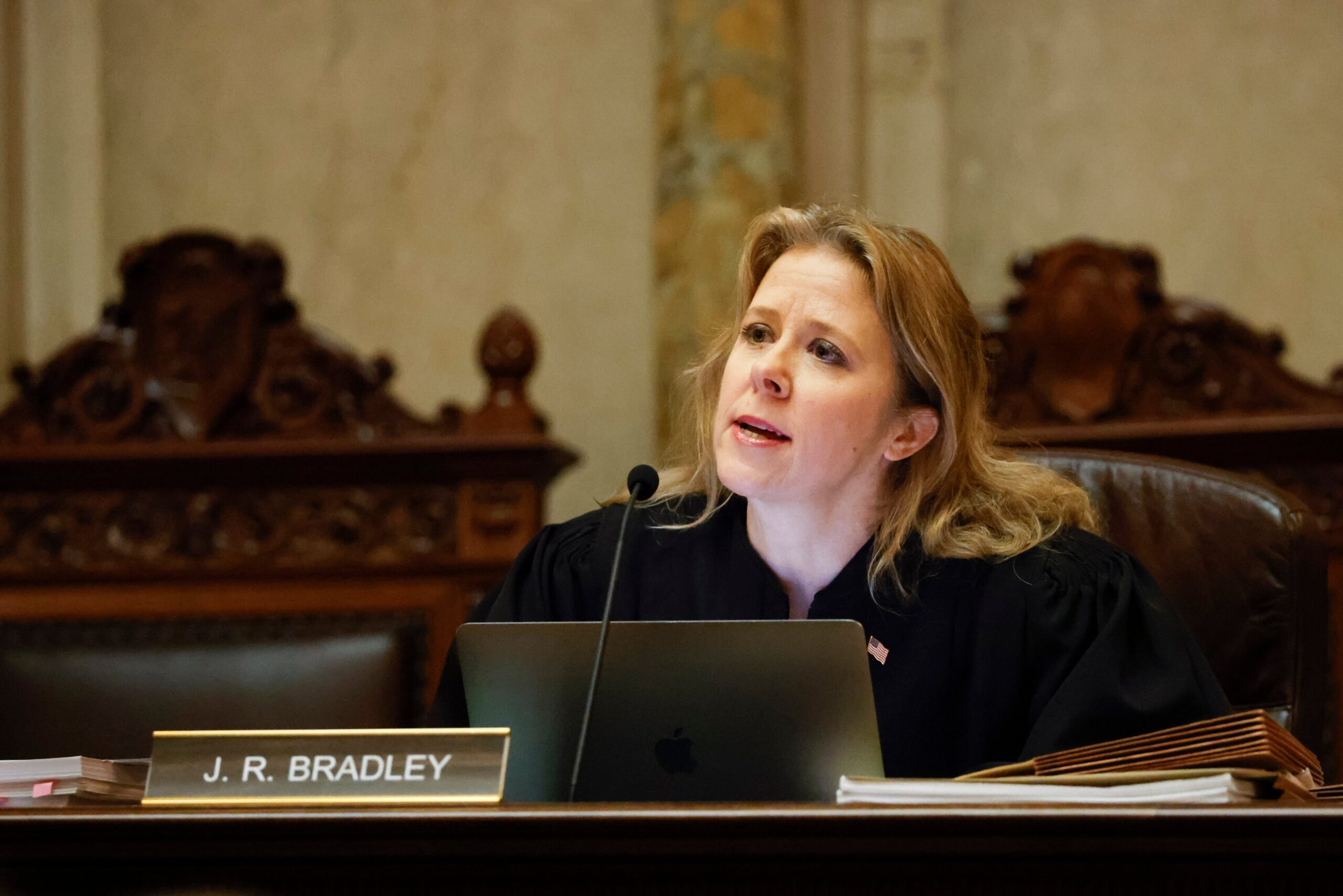The stage for Wisconsin’s pivotal April Supreme Court election is set after Milwaukee County Judge Janet Protasiewicz and former Supreme Court Justice Dan Kelly emerged as the top two vote-getters in Tuesday’s four-way primary.
With 94 percent of precincts reporting as of 10:40 p.m., unofficial results reported by the Associated Press showed Protasiewicz with 46 percent of the vote followed by Kelly with 24 percent. Waukesha County Judge Jennifer Dorow came in third with 22 percent of the vote, followed by Dane County Judge Everett Mitchell with about 8 percent.
News with a little more humanity
WPR’s “Wisconsin Today” newsletter keeps you connected to the state you love without feeling overwhelmed. No paywall. No agenda. No corporate filter.
Tuesday’s results place Protasiewicz and Kelly on a collision course toward what will be one of the most closely watched elections in the country this year. While the race is officially nonpartisan, Protasiewicz is backed by Democrats and Kelly by Republicans.
The campaign is expected to shatter spending records for a Wisconsin Supreme Court race, and it could quite possibly break the national spending record for a state supreme court contest.
The prize attracting so much attention is a ten-year term on Wisconsin’s Supreme Court, where the winner will decide the high court’s ideological balance. A Kelly victory would preserve the court’s 4-3 conservative edge, while a Protasiewicz win would give liberals a majority for the first time since 2008.
The consequences of Wisconsin’s Supreme Court race are hard to overstate. Should Protasiewicz win the general election on April 4, the court could revisit its 2022 redistricting decision that helped Republicans grow their already lopsided majorities in the Wisconsin Legislature. Justices could also overturn Wisconsin’s pre-Civil War abortion ban.
“It’s hard to put into words what a wild ride this campaign is going to be from here on out,” said Anthony Chergosky, a professor of political science at the University of Wisconsin-La Crosse. “The national attention, the interest group involvement, the money that is on the way — it is all going to make for a history-setting judicial election.”
Protasiewicz far outpaced her rivals in fundraising during the primary. As of Friday, her campaign had reported raising a total of nearly $2.2 million, which was more than the other three candidates combined. More than $530,000 of Protasiewicz’ haul came in the form of large donations in the last two weeks of the race.
She energized supporters, in part, by talking in blunt terms about issues that could come before the court, like redistricting and abortion. In prepared remarks released by her campaign Tuesday night, Protasiewicz said her voters deserved to know her values.
“You deserve to know what any candidate seeking this office believes,” Protasiewicz said. “I value a woman’s freedom to make her own reproductive healthcare decisions with her doctor, family, and faith. I also value our democracy and believe every Wisconsinite deserves to be fairly represented.”
Kelly’s primary campaign fundraising paled in comparison as he raised a total of $470,000, including $56,000 in late donations. But he had loads of help from GOP megadonor Richard Uihlein, who gave at least $1.5 million to a pro-Kelly group called Fair Courts America. A running tally of campaign spending maintained by the Brennan Center for Justice estimated Fair Courts America purchased more than $2.4 million in ad buys as of Tuesday.
In prepared remarks Tuesday night, Kelly criticized Protasiewicz, saying she was telling voters how she planned to rule on cases.
“If we do not resist this assault on our Constitution and our liberties, we will lose the Rule of Law, and will find ourselves saddled with the Rule of Janet,” Kelly said. “We must not allow this to come to pass.”
Dorow, a fellow conservative, raised about $760,000, but it was her personal story that supporters hoped would carry her through the primary. She gained national attention when she oversaw the criminal trial of Darrell Brooks Jr., the man who killed six people and injured dozens of others when he plowed his SUV through the Waukesha Christmas Parade. Dorow sentenced Brooks to consecutive sentences of life in prison for each of the six people killed.
Dorow’s candidacy also underscored the doubt some conservatives felt about Kelly’s chances of winning a general election. Kelly was appointed to the state Supreme Court by former Republican Gov. Scott Walker in 2016. He lost his only prior election in April 2020 to current Justice Jill Karofsky by an 11 percentage point margin.
Mitchell trailed the other candidates in fundraising, although he was endorsed by former Democratic Gov. Jim Doyle and former Supreme Court Justice Louis Butler. Butler was Wisconsin’s first ever Black state Supreme Court justice. Mitchell was vying to be the second.
Other justices, both current and former, also got involved in the primary. Protasiewicz was endorsed by Justices Ann Walsh Bradley and Rebecca Dallet, two members of the court’s liberal bloc. After results came in Tuesday, Karofsky, who had remained neutral during the primary, also endorsed Protasiewicz.
Dorow was endorsed by conservative Justice Patience Roggensack, whose pending retirement set the stage for this election. But Kelly had the vocal endorsement of conservative Justice Rebecca Bradley, who wrote an op-ed on his behalf in the Waukesha Freeman. Bradley wrote that voters had “no idea how Judge Dorow will decide cases,” urging people to watch video of the candidates’ first debate when Dorow read from her notes as she answered questions.
“A candidate using a binder to provide answers to questions is simply unprepared for the rigors of a statewide campaign, much less to do the job of a Supreme Court justice,” Bradley wrote.
The rift between Kelly and Dorow was so pronounced in the primary that Kelly declined to say in early February whether he’d endorse Dorow. At the time, Dorow said she would “unequivocally” endorse Kelly if he won the primary.
After results came in Tuesday, Kelly said he respected Dorow “for the good and important work she has done on the Waukesha County Circuit Court,” urging Dorow’s voters to support his candidacy in April.
Chergosky said conservative infighting was one of the defining characteristics of this year’s supreme court primary.
“Competitive primaries can be helpful in the sense that they lead to stronger candidates going into the general election,” Chergosky said. “But competitive primaries can also leave harsh feelings and they can also leave some strained coalitions.”
Chergosky said one outstanding question coming out of the primary was whether Wisconsin conservatives had repeated the same mistakes they made in last year’s race for governor, when a combative primary between Republicans Tim Michels and Rebecca Kleefisch may have weakened Michels in the general election.
Campaign ad spending in the supreme court primary reached $9.2 million according to a running tally tallies of television advertising maintained by the firm AdImpact Politics. More than half of that total was spent on pro-Kelly or anti-Dorow ads, according to the firm.
With the field now narrowed, outside spending from both parties will hit Kelly and Protasiewicz with a barrage of attacks. The state’s political parties will also get more involved, although early signs point to the Democratic Party of Wisconsin being a major player. It raised $3.5 million in the first five weeks of the year, with the help of a $2 million donation from Reid Hoffman, the co-founder of LinkedIn. Over the same five weeks, the Republican Party of Wisconsin raised just $56,000.
The previous record for spending in a Wisconsin Supreme Court race was set in 2020, according to the Wisconsin Democracy Campaign. That year, $10 million was spent between outside groups and candidates.
“My bet is that this time it’ll be triple that or more,” said Wisconsin Democracy Campaign Director Matt Rothschild.
According to the Brennan Center, which is also tracking Wisconsin’s race, the national record for spending on a single state supreme court seat was set nearly 20 years ago, when $15.2 million was spent on the 2004 Illinois Supreme Court race.
Wisconsin Public Radio, © Copyright 2025, Board of Regents of the University of Wisconsin System and Wisconsin Educational Communications Board.







